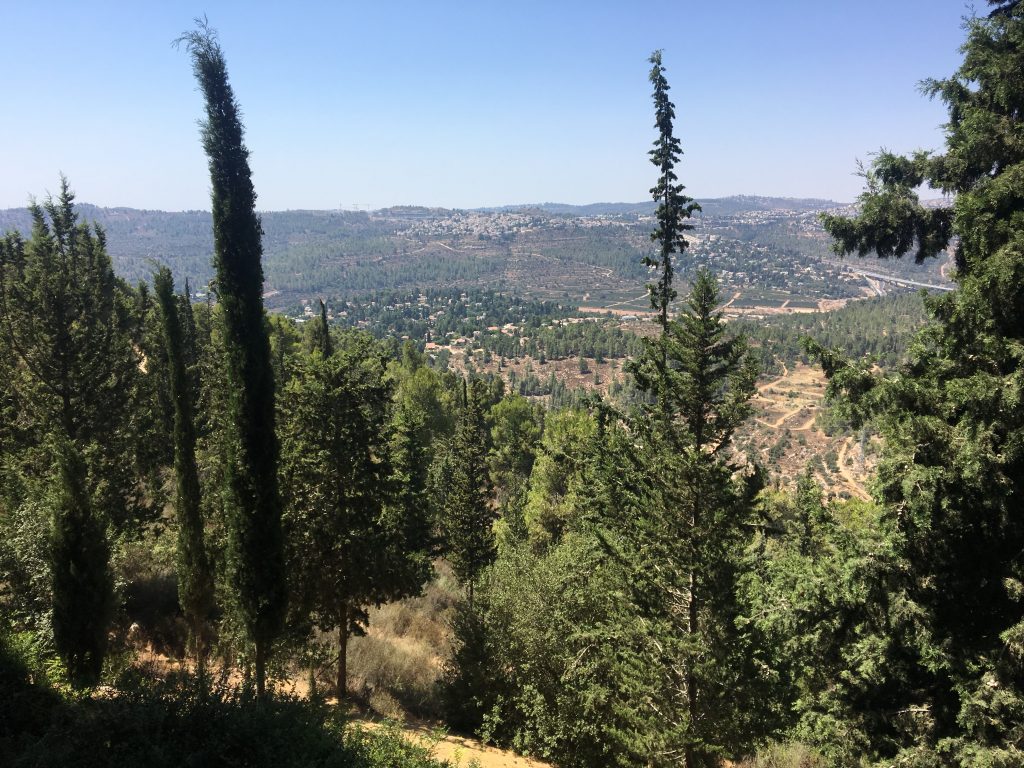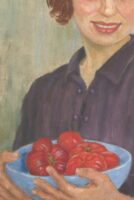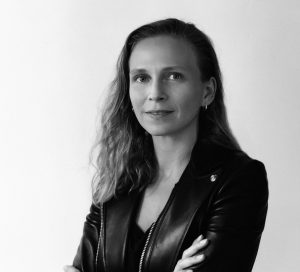Blast | March 12, 2021

“The Names of the Saints” by Megan Peck Shub
BLAST, TMR’s online-only prose anthology, features fiction and nonfiction too vibrant to be confined between the covers of a print journal. In Megan Peck Shub’s “The Names of the Saints,” set in contemporary Israel, a couple’s visit to the national cemetery at Mount Herzl exposes both the flaws in human relationships and the deep dignity of enduring grief. This story is Shub’s fiction debut.
The Names of the Saints
by Megan Peck Shub
“Isn’t this the cemetery where your uncle is buried?” she asked Daniel. They were in the car leaving Jerusalem, where they’d spent the day on a walking tour. They’d seen the wall and the market and, best of all, the Church of the Holy Sepulchre, where a hooded clergyman had proceeded like a zombie through the room, swinging his brass thurible of burning incense, the clouds of myrrh billowing everywhere. She got a kick out of it.
His eyes pivoted to the cemetery and back to the road, a four-lane highway winding gradually down the mountain. He always drove carefully, hands at ten and two, and if he drank more than a thimble of anything, he wouldn’t touch the car keys. He was good.
“Yes, that’s it,” he said. “Mount Herzl. That’s where all the soldiers are buried. Well, many of them.”
“Is it still open? Pull over,” she said.
“Really?” he said, but he flicked the turn signal and pulled the car into the empty parking lot along the road.
“Do you remember where the grave is?”
“I can figure it out,” he said. “I came here so often with my grandmother. I’d have to be able to figure it out.”
They got out of the car and walked toward the entrance. It was after 5 o’clock; at that hour only a few other cars sat in the parking lot while traffic jammed the road, which was a major thoroughfare leading out of Jerusalem’s old city. Tour buses idled at the volume of jumbo jets, expelling streams of ash-colored clouds. As a child, at the close of every school day, she’d walked through a canyon of yellow buses in the anxious search for her own. The loud, sudden bursts from their hydraulic brakes frightened her. The hissing came randomly. There was no way to prepare for it—and that was the scary part.
They entered the cemetery through an open gate, and, as if someone had turned a radio dial, the street noise faded to the whistling of the high tree branches catching wind rushing from the valley below. They passed the shuttered visitor center and a posted map. Someone had scratched “fuuuck you” into the plexiglass over the “you are here” marker. She lingered for a second.
“Would this be of any use?” she said.
“No, I think it’s this way. I remember,” he said, and started up one side of a forking path.
***
Not long after they started dating, Daniel had told her about his weekends with his grandmother, Esther, and their visits to his dead uncle’s grave. Uncle Eli had died in the First Lebanon War, back in 1982, a few years before Daniel was born. “He was twenty years old,” Daniel said whenever Eli came up, his tone lined with sadness and disgust. “A kid.”
The cemetery was built into the mountainside in a series of long flat terraces, the collections of graves organized by war. As they walked along the stone pavers, she meandered, taking in the information engraved on the headstones. They had died, after all; reading their names was the least she could do; it only seemed fair. But Daniel was focused, forging ahead, once in a while thinking out loud about his grandmother. He paused occasionally, as if the precise direction and temperature of the light or the sensation of the breeze could trigger a memory as evidence, as a clue.
“Here,” he said, pointing to a particularly steep incline, which they scaled halfway before pausing.
“She had a cane, you know? She hobbled all the way up here,” he said.
“Did she?” she said, a little winded.
“And she did this every single weekend,” he said, turning around and heading back upward. “We’re getting close.”
Once they cleared the incline, the terrain leveled out again and they approached a circle of World War II-era headstones. A small tour group dispersed in their direction—a local guide trailed by three American tourists stupidly wearing their sunglasses atop their baseball caps.
“I remember this area,” Daniel said. “Hannah Szenes is buried here.”
“Who is that?”
“She already lived in Israel during the war, but she went back to Europe to try to save people. She was a spy. Yeah, look, here she is.”
They paused to take in the headstone, which looked nothing like the grave of a national hero. No statue. No monument. It was like all the others, distinguished only by the foot traffic coming and going, the American tourists aiming their pricey SLRs at the nondescript granite stone etched with a few Hebrew words.
“Eli’s grave was not far from hers,” he said, starting to walk again. They approached another group of graves, this one the biggest yet, the size of a few lots in a suburban subdivision. The headstones dated from the early 1980s, but the name of the war was unfamiliar.
“Operation Peace for Galilee,” she read.
“Yeah, not quite,” he said. “They started off calling it that, I guess. It wasn’t always the ‘First’ Lebanon war either—there had to be a second to make this one the first. But the headstones don’t change.”
“No,” she said. Gravel had worked its way into her shoe, and she hopped onto one foot to remove it.
“Eli didn’t have to be buried here,” Daniel said. “But it was important to my grandfather that he was. My grandfather wasn’t the person who had to drive to Jerusalem and climb up this fucking mountain every weekend, though. It was my grandmother who did that.”
“Why was it important to him?” she said. She knocked the sole against a palm, dislodged a few little rocks, and shoved her foot back into the shoe.
“Because this is where the heroes are buried, of course,” he said, motioning to the epic view from the mountainside. He shook his head.
She’d heard Daniel’s grandfather speak about Eli only once, a few years ago, during a visit to his apartment at an old folks’ home an hour south of Tel Aviv. After lunch, she’d wandered into the spare bedroom and saw, propped up on a stack of cardboard file boxes, a black-and-white portrait of a young man who looked a little like Daniel.
“Such a shame,” his grandfather had said in his labored English as he passed behind her. But that was all he said.
Over a stone ledge, which protected visitors from tumbling down the steep slope, distant buildings glowed off-white in the late-afternoon light, and faint construction noises echoed from cranes across the valley.
“Wouldn’t you want to be buried among the nation’s great Zionists and prime ministers and fallen soldiers?” Daniel said, winking at her before turning his gaze back over to the headstones.
“We’re getting close. This feels familiar.”
“Why don’t you start at one end, and I’ll start at the other?”
He removed his baseball cap and ran a hand over his bald head. He had shaved it this morning as she took a shower, the steam totally obscuring the mirror. He’d carried on even without seeing his reflection. He knew all the contours of his skull.
“He’s in here somewhere,” Daniel said and put the cap back on his head.
***
All the graves were identical: headstones a few feet tall, with names and dates etched into the stone. Simple. Stalwart. At the bases of the headstones lay rectangular planters measuring a few square feet. Manicured patches of rosemary grew in most of the planters, but a few yielded signs of personalization: pebbles, trinkets or photos, flags, flowers still in bloom.
She moved from grave to grave, sounding out the Hebrew names letter by letter and reading the ages of the deceased. Eighteen. Eighteen. Nineteen. Eighteen. Twenty. Twenty-one.
Her mother always said that having a child was like having your soul exist outside your body. She imagined Daniel’s grandmother’s pregnancy. Imagined growing a baby for nine months, enduring the pain of delivery. The crib, the nursery, the late nights, the baby becoming a child blowing out birthday candles year after year after year until he is a man. All the love and optimism. And then, one day, a soldier approaching her front door. Her son is a soldier, but this soldier is not her son. She imagined Esther seeing him through the curtains. Unsmiling, the soldier rolls a steel barrel up the driveway and knocks on her front door. He douses the barrel’s insides with gasoline, lights a match, and tosses it into the barrel. He does it just for show. Her soul is not there in the barrel. Her soul is not there in her body. Her soul is lying somewhere in a field far away.
The smoke from the barrel reaches all the way to the top of the sky.
***
“Here he is,” Daniel said from a few rows up. She cut over, taking care not to step on the planters. Eli’s grave looked like the graves of all the others, even the hero Hannah Szenes.
Daniel took a seat on the stone border of the neighboring grave and crossed his arms over his knees. She sat beside him.
“Every weekend I stayed with her, she brought me here. Sometimes she’d bring flowers. Sometimes we just came here and sat like this.”
She plunged a hand into the rosemary and broke off a few inches, rolling it back and forth in her palms, releasing a hit of fragrance.
“It was so hard for her to scale that hill with her cane; I can’t stop thinking about it,” he said.
“It’s difficult to imagine that kind of devotion,” she said.
“We’ll have kids one day,” he said. “And then you’ll know.”
“Will we?” she said.
The night before, at his parents’ house, the entire family had carried on for an hour debating a recent essay about the morality of having children amid looming climate change. Daniel stayed mostly silent as she and his sisters volleyed arguments back and forth. She enjoyed herself with Daniel’s family, which felt like the family she should’ve had, and their visits always felt to her like coming home.
“How about you get married, Daniel, and then we’ll come back around to this conversation?” his younger sister said, lighting up a cigarette as the seconds of silence accumulated into something uncomfortable for everyone.
“You should leave early for Jerusalem tomorrow,” his mother said to Daniel, getting up from her chair and collecting the empty dishes. “The traffic will be a nightmare.”
***
An old couple emerged from behind the bend in the road, the woman with a scarf tied around her head and knotted beneath her chin, her black orthopedic shoes kicking up dust. The man swatted his palm with a folded-up newspaper and then raised it, as if to say hello.
Daniel took a deep breath. “When I was a kid, it felt like Eli’s death was ancient history. But he only died a few years before I was born, and—even in my earliest memories of coming her—this grave was barely ten years old.”
He removed his glasses and, in one swipe with his pointer finger and thumb, scooped tears from beneath both eyes. She’d never been able to see him cry without doing so herself.
The sun had descended almost completely behind a mountain, creating a darkness that reduced the clusters of buildings throughout the valley to their twinkling lights. She remembered learning in elementary school that a beam of light could travel, theoretically, forever, a fact she considered often, especially when riding in her mother’s car at night, staring up through the sunroof at all the stars. “How is there no wall where this all ends?” she used to think. Even as a little girl, she couldn’t believe in God.
Daniel smiled at her, “What are you thinking about?” he asked, and she shook her head. From everywhere, the distant roar of traffic sounded like waves hitting the shore.
They’d spent a few hours at the beach in Tel Aviv the day before. For chairs, Daniel dropped some shekels into the automated rental kiosk, and they walked fifty yards through the throng of people before finding a vacant spot beside an oil-slathered man listening to Russian radio on a boom box.
Daniel had looked at the radio and back to her. “No,” he’d mouthed. She motioned to the chairs around the—all full.
A louche young attendant had come over to collect their ticket. As he waited for Daniel to fish it out of their tote bag, he stuck a Marlboro Red into his mouth, lit it, and drew in a huge breath. She’d wanted to bum one, but she didn’t ask.
“Here,” Daniel had said, handing the ticket over. The attendant took another drag of his cigarette and expelled the smoke in Daniel’s direction. He walked away without thanking them.
“I hate Israelis,” Daniel had said, sitting down. He pulled his hat over his eyes and fell asleep immediately. She opened a book and read a few lines without concentrating before shutting it. In the row of chairs behind her, an American bachelorette party discussed their upcoming manicure appointments.
“I know, but you have to go with my colors,” the bride had said in a Brooklyn accent. She was chewing bubble gum. “It’s one day of your life, honey. Some people have real problems, you know?”
***
She broke off another sprig of rosemary and put it in her bag, the resin sticking to her fingertips. She sometimes saved odds and ends from places as a way of holding on to them. The shelves in her apartment hosted rocks, shells, and pine cones. Pamphlets. Trashy tourist keepsakes. Little cards from cathedrals with the pictures and the names of the saints.
“Do you think your grandfather wanted Eli buried here as a way of getting back at your grandmother?” she asked.
His grandparents had divorced when Daniel’s mother was thirteen. One night, his mother drank a few glasses of wine and said that Esther had had an affair with her piano teacher. Her father had basically disappeared after that. And then, of course, Eli was killed in a tank explosion.
All of a life in a barrel and a lit match thrown in.
“I don’t know,” Daniel said.
“Would you ever ask him?”
“No. Never.”
Daniel hoisted himself up from the grave, beating the dust off his palms on his jeans. He took his glasses from his front pocket and put them back on his face.
“This has been good,” he said, extending a hand to her. “Traffic could be bumper-to-bumper, even this late. Let’s get going.”
By the time they returned to the parking lot, the sky was black as a tarp pulled high over their heads, and the stars like little punched holes, illuminated by something shining back from the other side. They got back in the car and resumed their place in the procession of cars headed down the mountain.
Megan Peck Shub is a segment producer at Last Week Tonight with John Oliver. Previously, she produced Finding Your Roots with Henry Louis Gates Jr. on PBS. She lives in New York, but she’ll always be a native Floridian. This is her fiction debut.
SEE THE ISSUE
SUGGESTED CONTENT

Blast
Apr 26 2024
“The Side Effects” by Paul Curley
BLAST, TMR’s online-only prose anthology, features prose too vibrant to be confined between the covers of a print journal. In Paul Curley’s “The Side Effects,” a recently bereaved father and… read more

Blast
Apr 12 2024
“The Red Button” by Jim Steck
BLAST, TMR’s online-only prose anthology, features prose too vibrant to be confined between the covers of a print journal. “The Red Button” takes place in Southern California in 1974, when… read more

Blast
Mar 28 2024
“The Troop Leader” by Brynne Jones
BLAST, TMR’s online-only prose anthology, features prose too vibrant to be confined between the covers of a print journal. In Brynne Jones’s “The Troop Leader,” the adult chaperone of a… read more


